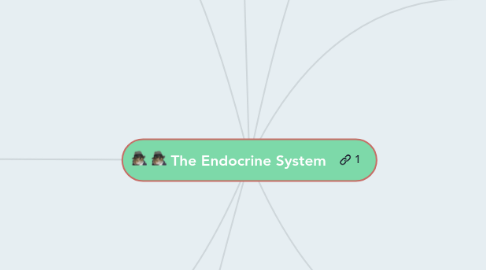
1. Thyroid Gland
1.1. Effects
1.1.1. Metabolism
1.1.2. Energy Levels
1.2. Produces
1.2.1. T4
1.2.2. T3
1.3. Hormones
1.3.1. High levels
1.3.2. Low Levels
1.3.2.1. Overactive Thyroid
1.3.2.2. Need Iodine
1.3.2.3. iritablilty
1.3.2.4. Fatigue
2. Pituitary Gland
2.1. Posterior Pituitary
2.1.1. Antidiuretic
2.1.1.1. Reclaims water from the Kidney and conserves it in the bloodstream
2.1.2. Oxytocin
2.1.2.1. Stimulates the contraction of the Uterus muscles
2.2. Anterior Pituitary
2.2.1. Growth Hormones
2.2.1.1. Ecsessive
2.2.1.1.1. Results in Giantism
2.2.1.2. Deficient
2.2.1.2.1. Results in Dwarfism
2.2.2. Sex Hormones
2.2.2.1. Luteinising
2.2.2.1.1. Controls the production of sex steroids like estrogen and testosterone
2.2.3. Stimulates
2.2.3.1. Muscle Growth
2.2.3.2. Bone Growth
2.2.3.3. Muscle Growth
2.2.4. Prolactin
2.2.4.1. Milk Production
2.2.5. Follicle Stimulating Hormone
2.2.5.1. Ovaries
2.2.5.1.1. Egg Production
2.2.5.2. Testes
2.2.5.2.1. Sperm Production
3. Parathyroid
3.1. Hyperparathyriodism
3.1.1. Excessive thyroid hormone production
3.1.1.1. Causes dehydration and bone tenderness
3.2. Hypoparathyriodism
3.2.1. Decreased thyroid hormone production
3.2.1.1. Causes muscle cramps, convolutions and tingling
3.3. Function
3.3.1. Regulates the blood's calcium and phosphate levels
3.3.1.1. Allows the muscular and nervous systems to funtion propertly
4. Thymus
4.1. Thymosin
4.1.1. Stimulates the production of T-Cells
4.1.1.1. T-Cells are a specific form of white blood cells
4.1.1.1.1. Assist the immune system in fighting off disease
4.2. Located in the upper anterior of the chest
4.3. Thymus gland does not function for an entire lifetime
5. Adrenal Glands
5.1. Adrenal Cortex
5.1.1. Cortisol
5.1.1.1. Stress Hormone
5.1.2. Aldersterone
5.1.2.1. Regulation of blood pressure
5.2. Adrenal Medulla
5.2.1. Produces Adrenaline
5.2.1.1. Fight or Flight
6. Hypothalamus
6.1. Regulates
6.1.1. Hunger
6.1.2. Thirst
6.1.3. Body Temperature
6.1.4. Sleep
7. Pancreas
7.1. Essentials
7.1.1. maintains body's glucose
7.1.2. Diabetes
7.2. Hormones
7.2.1. Gastrin
7.2.2. Glucacon
7.2.3. Insulin
7.2.4. Somatostatin
7.2.5. Vasoactive intestinal peptide
7.3. Disorders
7.3.1. Type 1 Diabetes
7.3.1.1. Body does not produce insuline
7.3.1.1.1. Cannot handel the Glucose Fluxuations
7.3.2. Type 2 Diabetes
7.3.2.1. Contracted from
7.3.2.1.1. Lack of exercise
7.3.2.1.2. DIet
7.3.2.1.3. Lifestyle Choices
7.3.2.2. Can produce insuline
7.3.2.2.1. Do not use it correctly
7.3.3. Hyperglycemia
7.3.3.1. High Glucose levels
7.3.3.1.1. Frequent urination
7.3.3.1.2. Increased thirst
7.3.4. Hypoglycemia
7.3.4.1. Low Blood Glucose
7.3.4.1.1. Shakiness
7.3.4.1.2. Nervousness or anxiety
7.3.4.1.3. Headaches
7.3.4.1.4. Seizures
7.3.4.1.5. Unconsciousness
7.3.4.1.6. Anger, stubbornness, or sadness
8. Ovaries
8.1. Influences
8.1.1. Blood Circulation
8.1.2. Sex drive
8.2. Manifestations
8.2.1. Mood Swings
8.2.2. menstration
8.2.3. Hot Flashes
8.3. Produces
8.3.1. Estrogen
8.3.2. Progesterone
8.4. Disease
8.4.1. Oesteoporosis
8.4.2. Ovarian Cancer
8.4.3. Ovarian Csysts
